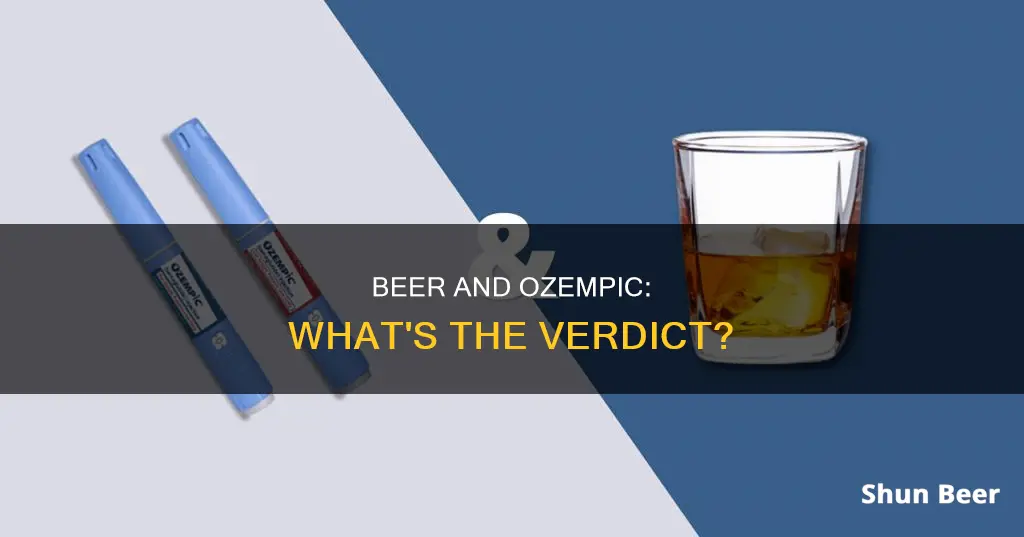
Ozempic is a medication for managing blood sugar in adults with Type 2 diabetes. It is also used off-label for weight loss. While there is no direct interaction between alcohol and Ozempic, there are several reasons why drinking alcohol while taking Ozempic may not be advisable. Firstly, alcohol can negatively affect blood glucose levels, causing them to drop too low (hypoglycemia). This can be dangerous, especially for those taking insulin or other diabetes medications alongside Ozempic. Secondly, alcohol consumption may reduce the weight loss benefits of Ozempic by slowing metabolism and increasing the risk of overeating. Thirdly, alcohol may worsen the side effects of Ozempic, such as nausea, vomiting, and digestive issues. Finally, regular alcohol consumption can lead to long-term health risks such as high blood pressure, stroke, and liver, heart, and kidney diseases. Therefore, while occasional moderate alcohol consumption may be acceptable for some people taking Ozempic, it is important to consult with a healthcare professional and monitor blood sugar levels closely to ensure safe and effective use of the medication.
| Characteristics | Values |
|---|---|
| Can I drink beer on Ozempic? | Yes, but it is not risk-free. |
| Is there a direct interaction between Ozempic and alcohol? | No. |
| Should I drink alcohol on Ozempic? | It depends. Occasional drinking is probably okay if your blood sugar levels are under control. |
| How much alcohol can I drink on Ozempic? | It is recommended to limit alcohol consumption to two drinks per day for men and one drink per day for women. |
| What are the risks of drinking alcohol on Ozempic? | Increased risk of hypoglycemia, worsening of side effects, long-term health risks such as high blood pressure, stroke, and liver, heart, and kidney diseases. |
| What precautions should I take if I drink alcohol on Ozempic? | Drink with food, stay hydrated, monitor blood sugar levels, and consult a healthcare provider. |
What You'll Learn

Ozempic and alcohol may cause low blood sugar
Ozempic (semaglutide) is a medication prescribed to help lower blood sugar levels in people with type 2 diabetes. It is also used off-label to aid weight loss. While there is no direct interaction between Ozempic and alcohol, consuming alcohol while taking Ozempic may lead to several adverse effects, including low blood sugar (hypoglycemia).
Ozempic is a once-weekly injectable medication that works by mimicking a gut hormone called glucagon-like peptide-1 (GLP-1). GLP-1 has targets in several organs, including the pancreas, gut, and liver, as well as areas of the brain involved in regulating metabolism and appetite. By stimulating GLP-1 receptors, Ozempic increases insulin production, reduces appetite, and slows digestion, thereby helping to control blood sugar levels.
Alcohol can cause both short-term and long-term changes in blood sugar levels. When alcohol is consumed, the liver's ability to produce glucose is blocked, which can lead to a drop in blood sugar levels. Additionally, alcohol can increase insulin release, further contributing to lower blood sugar. This effect is particularly pronounced in people with type 2 diabetes, as their blood sugar levels are already being managed by medications like Ozempic.
The combination of Ozempic and alcohol can increase the risk of hypoglycemia. While Ozempic works to lower blood sugar levels, alcohol can also independently cause a drop in blood sugar. As a result, consuming alcohol while taking Ozempic may lead to dangerously low blood sugar levels. Hypoglycemia can cause a range of symptoms, including anxiety, behavioural changes, blurred vision, cold sweats, confusion, weakness, and nausea. Left untreated, severe hypoglycemia can lead to seizures and even coma, posing a life-threatening situation.
How to Drink Safely on Ozempic
If you are taking Ozempic and choose to consume alcohol, it is important to follow certain guidelines to reduce the risk of low blood sugar and other adverse effects:
- Drink in moderation: Limit your alcohol consumption to no more than two drinks per day for men and one drink per day for women.
- Avoid drinking on an empty stomach: Drinking alcohol without eating can increase the risk of hypoglycemia.
- Stay hydrated: Drink plenty of water before, during, and after consuming alcohol to counteract the dehydrating effects of both alcohol and Ozempic.
- Monitor blood sugar levels: Keep a close eye on your blood sugar levels before, during, and after drinking alcohol.
- Have fast-acting carbohydrates on hand: In case of low blood sugar, keep glucose tablets or juice nearby to quickly raise your blood sugar levels.
- Consult your healthcare provider: Discuss your alcohol consumption with your doctor to ensure it is safe based on your individual health needs.
Combining Beer and Malt: A Safe Drinking Experience?
You may want to see also

Alcohol may worsen Ozempic's side effects
Additionally, alcohol can negatively affect your blood glucose levels while taking Ozempic, causing them to drop too low (hypoglycemia). Hypoglycemia can lead to dizziness, fainting, and in severe cases, coma, seizures, and even death. Alcohol interferes with how the liver helps maintain blood glucose levels, and when combined with Ozempic, the risk of hypoglycemia increases.
It is important to note that Ozempic may also reduce your desire to drink alcohol. Ozempic works by mimicking a gut hormone called glucagon-like peptide-1 (GLP-1), which has targets in the reward-related areas of the brain. When you drink alcohol, dopamine is released, activating your brain's reward system. However, the GLP-1 targets in these areas may block or lessen this dopamine boost, reducing the pleasurable feelings associated with alcohol consumption.
To minimise the potential negative effects of alcohol while taking Ozempic, it is recommended to drink in moderation, avoid drinking on an empty stomach, stay hydrated, and closely monitor your blood glucose levels.
Drinking Beer While Pregnant: How Much Is Too Much?
You may want to see also

Ozempic may reduce your desire to drink alcohol
Ozempic (semaglutide) is a once-weekly injection for adults with Type 2 diabetes. It works by mimicking a gut hormone called glucagon-like peptide-1 (GLP-1). GLP-1 has targets in several different organs, including the pancreas, gut, and liver. There are also GLP-1 targets in areas of the brain involved in regulating your metabolism and appetite.
When you drink alcohol, a chemical called dopamine is released, which activates your brain's reward system and makes you feel good. However, the GLP-1 targets in the reward-related areas of the brain may block or lessen this dopamine boost, reducing the "feel-good" chemicals that you would usually get from drinking alcohol. This could explain why some people may not have the same desire to drink alcohol while taking Ozempic.
Animal studies have supported this theory, showing that medications similar to Ozempic may reduce not only alcohol use but also the use of other substances such as cocaine, nicotine, and amphetamines. As a result, researchers are currently studying Ozempic as a potential treatment for alcohol use disorder.
While there is no known direct interaction between Ozempic and alcohol, it is important to note that alcohol can negatively affect your blood glucose levels, especially if you have Type 2 diabetes. Alcohol can interfere with how your liver helps keep your blood glucose levels in balance, increasing the risk of hypoglycemia (low blood sugar). Therefore, if you choose to drink alcohol while taking Ozempic, it is crucial to monitor your blood glucose levels and follow your healthcare provider's instructions on managing hypoglycemia.
Additionally, alcohol consumption may reduce the weight loss benefits of Ozempic. Alcoholic beverages are often calorie-dense, and drinking can stimulate your appetite and lower your inhibitions, leading to poor food choices. Alcohol can also slow down your metabolism, making it more challenging to lose weight. Therefore, if you are taking Ozempic for weight loss, limiting your alcohol intake may be advisable.
In summary, while Ozempic may reduce your desire to drink alcohol by blocking the dopamine boost associated with alcohol consumption, it is important to consult your healthcare provider and monitor your blood glucose levels if you choose to drink. Additionally, consider the potential impact of alcohol on your weight loss goals if you are using Ozempic for weight management.
Daytona Beach Beer Rules: What You Should Know
You may want to see also

Ozempic and alcohol can cause gastrointestinal issues
Ozempic (semaglutide) is a once-weekly injection for adults with Type 2 diabetes. It is a prescription injectable medication that helps to control blood sugar levels. While there is no direct interaction between alcohol and Ozempic, combining the two can lead to gastrointestinal issues.
Ozempic is a glucagon-like peptide-1 (GLP-1) receptor agonist. It works by mimicking a gut hormone that targets multiple organs, including the pancreas, gut, and liver, as well as areas of the brain. By stimulating the GLP-1 receptors in the pancreas, Ozempic helps to release insulin and control blood sugar levels. It also reduces appetite and slows digestion.
Alcohol can affect blood sugar levels and cause gastrointestinal issues. It can irritate the stomach lining, causing inflammation and slowing down how fast the stomach empties. This can result in nausea, vomiting, and stomach upset. Alcohol also adds extra calories to your diet and can affect your weight loss efforts.
When combined, Ozempic and alcohol can cause gastrointestinal distress. The common side effects of Ozempic, such as nausea, vomiting, diarrhoea, and stomach pain, may be worse when combined with alcohol. Alcohol can also increase the risk of dehydration, as both Ozempic and alcohol can contribute to fluid loss.
Additionally, alcohol can negatively affect blood glucose levels while taking Ozempic, causing them to drop too low (hypoglycaemia). This can be especially dangerous for people with Type 2 diabetes, as alcohol can interfere with how the liver helps to keep blood glucose levels in balance. Hypoglycaemia can cause symptoms such as anxiety, behaviour changes, blurred vision, cold sweats, confusion, weakness, and nausea.
How to drink safely on Ozempic
If you are taking Ozempic and want to consume alcohol, it is important to drink in moderation and be mindful of your blood sugar levels. Here are some tips for drinking safely on Ozempic:
- Discuss with your healthcare provider what is considered a safe amount of alcohol for you.
- Avoid drinking on an empty stomach.
- Stay hydrated by drinking water before, during, and after consuming alcohol.
- Monitor your blood glucose levels before, during, and after drinking.
- Keep fast-acting carbohydrates, such as glucose tablets, on hand in case of low blood sugar.
- Choose lower-sugar alcoholic beverages, such as light beers or wines, instead of sugary cocktails.
Ginger Beer and Celiac Disease: Is It Safe to Drink?
You may want to see also

Ozempic and alcohol can cause pancreatitis and kidney damage
Ozempic, Alcohol, and Pancreatitis and Kidney Damage
Ozempic (semaglutide) is a prescription drug used to control high blood sugar in people with type 2 diabetes. It is administered via a once-weekly injection. While there is no known direct interaction between Ozempic and alcohol, consuming alcohol while taking Ozempic can lead to dangerous hypoglycemia, especially for those also taking insulin.
Pancreatitis
Pancreatitis, or inflammation of the pancreas, is a rare but serious side effect of Ozempic. This condition can be incredibly painful and may require hospitalisation. Chronic, excessive alcohol consumption is also a leading cause of pancreatitis. Therefore, drinking alcohol while taking Ozempic may further increase the risk of developing pancreatitis.
Kidney Damage
Kidney problems are another serious potential side effect of Ozempic, even in individuals without prior kidney issues. Regular alcohol consumption is also detrimental to kidney health, with alcohol use disorder doubling the risk of chronic kidney disease. Consuming alcohol while taking Ozempic may, therefore, increase the risk of kidney damage.
Precautions
If you are taking Ozempic, it is important to be aware of the potential risks associated with alcohol consumption. While occasional moderate alcohol consumption may be acceptable, heavy or long-term drinking can increase the risk of serious complications such as pancreatitis and kidney damage. It is always advisable to consult a healthcare professional before consuming alcohol while taking any prescription medication, including Ozempic.
Drinking and Driving: One Beer with Dinner, Safe?
You may want to see also







